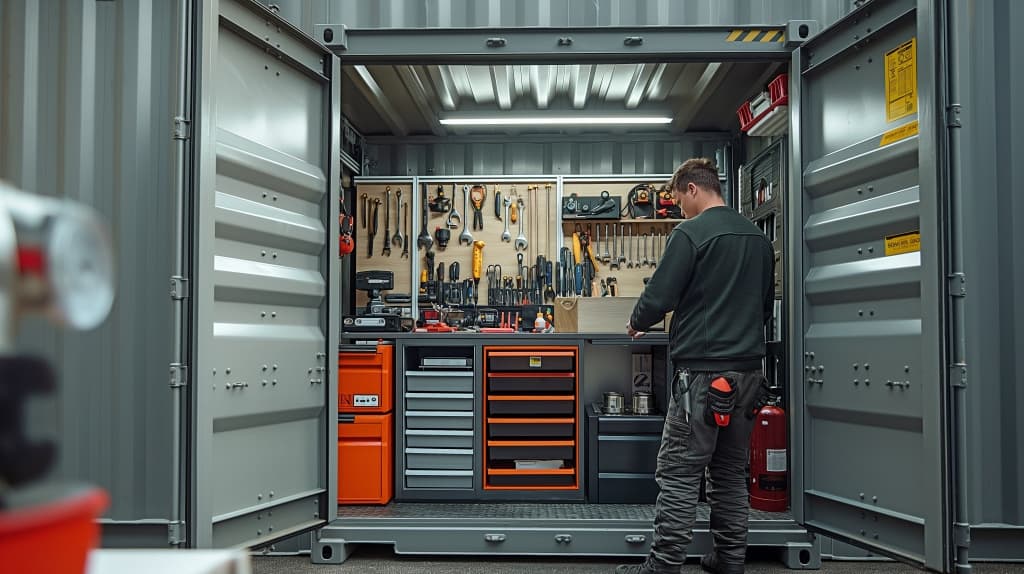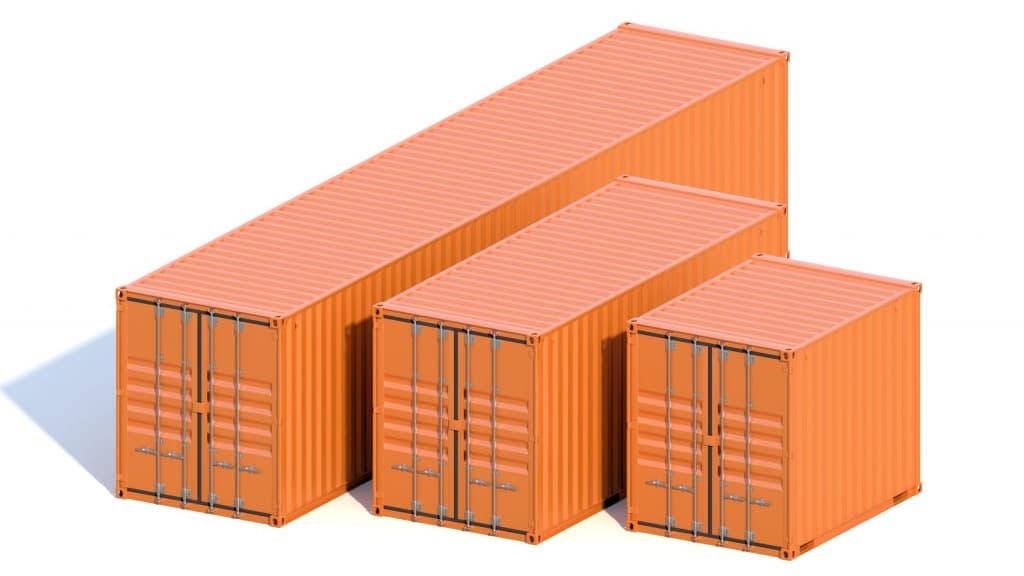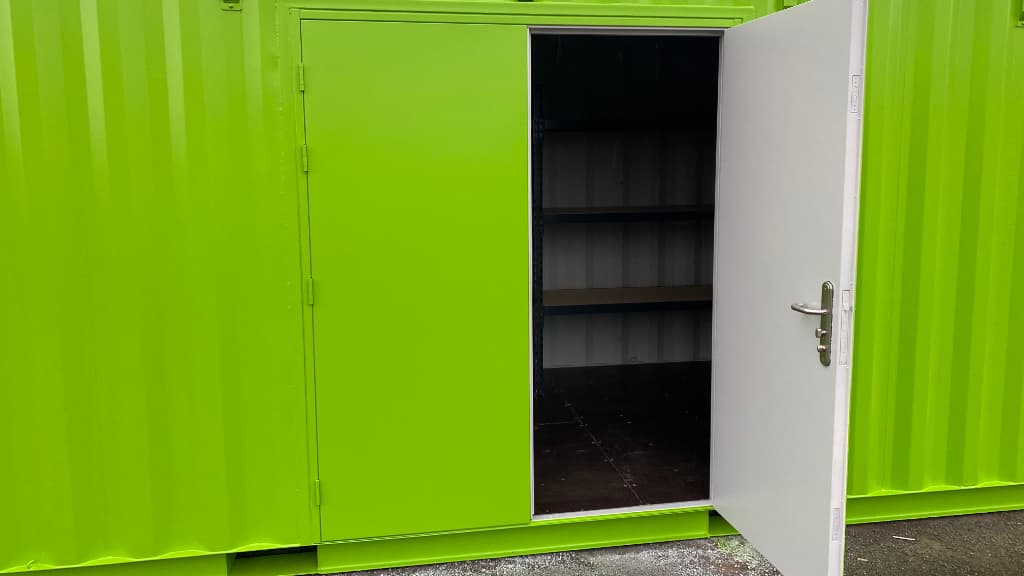A shipping container workshop is one of the most in-demand uses of the shipping container. This is because they are strong and robust, come in all shapes and sizes, and are weatherproof and secure. Shipping container workshops are an economical and durable way to add workspace at home and can be customised to meet your specific requirements.
- 6 Benefits of Using Shipping Containers as Workshops
- Different Types of Shipping Container Workspaces
- What size shipping container do I need?
- Do I need planning permission for a shipping container workshop?
- How to convert a shipping container and how much it will cost
- Container Costs
- Planning Permission Cost
- Customisation
- Container Conversions
- How to prepare for a shipping container workshop
- Where can I buy a shipping container?
- Shipping Container Conversions

With more of us working from home since the pandemic began in 2020, building a home extension is preferable to moving house for 2 in 5 homeowners, according to data by TSB Bank. However, house extensions can be a costly business. Converting a shipping container into a workshop is a more cost-effective option.
Whether you need a shipping container workshop for a woodwork hobby or for business needs, there are a few things to bear in mind with a shipping container conversion. In our blog, we will take a look at the benefits of using shipping containers as workshops, how shipping container conversions can be customised to meet your needs, and an overview of sizes and costs.
6 Benefits of Using Shipping Containers as Workshops
Shipping containers have become a popular option for creating a workshop in the comfort of your own home. This is because they come with a sleuth of benefits. Take a look at our top 6 benefits:
- Affordable – When you compare renting or building a workshop, a shipping container workshop is a far more cost-efficient option. Instead of paying an ongoing rental cost, a shipping container is a one-off purchase with the cost dependent on whether it is new or used, and on the size you require. Take a look at some examples of what a shipping container costs, starting from £1,225.
- Tighter Security – Shipping containers are made of high-grade reinforced metals, which protects a container from break-ins or damage. Our steel doors will also provide extra security. This will give you peace of mind that your tools and valuables stored inside will not be damaged or stolen. Garden sheds are far more vulnerable to break-ins as they are made from wood or plastic.
- Portable – Shipping containers were originally designed to carry cargo across seas during long arduous journeys. They are designed to endure being moved from one location to the next. Whether you’re moving house or just need to relocate the workshop, this can be easily achieved as shipping containers are designed to be portable and mobile.
- Customisable – A container workshop can be customised to meet your particular requirements. A container will come with workshop essentials; ceiling, walls and flooring. However, you can customise the space with any other necessities you require. This could include windows, lighting, decor, doors, electricity, workbenches and ventilation. Customisations can be done efficiently and without breaking the bank. Take a look at our container door parts available today.
- Durable – Shipping containers are made from reinforced metal for them to be weather-resistant, fireproof, and watertight. This makes a shipping container conversion an extremely durable option for a workshop. Even when faced with the harshest of conditions, a shipping container will last for many years. Compared to a garden shed, they are much more durable and last much longer.
- Sustainable – It’s never been more important for us all to make wiser choices when it comes to the environment. A recycled shipping container is a sustainable choice when it comes to building a workshop. It has already had a lifetime of use, moving goods to and from different parts of the world. Once a standard 40ft container is upcycled, it could be durable for another 50 years and could have two or more lives.
Different Types of Shipping Container Workspaces
Shipping containers can be customised to create extremely versatile and functional workspaces. Whether you want a space to get on with DIY or you need an outdoor office now you work at home, shipping containers are an affordable way to extend your home.
Commercial and Residential Workshops
Shipping container workshops are ideal for either commercial or residential use. They can be tailored to your needs, which means if you want to house a workshop at home or plan to set up a business in a commercial setting, either can be achieved. A shipping container supplier will be able to work with you to create the workshop you desire. Take a look at some examples of different types of conversions.
Home Office Space
Since the pandemic, when many of us were working from home, the need for a comfortable workspace at home has risen. More and more companies now offer employees a hybrid way of working. This is the ability to work from both home and the workplace. Between 19 and 30 January 2022, 36% of working adults reported having worked from home at least once in the last seven days because of the coronavirus (COVID-19) pandemic.
If you don’t have the luxury of a spare room, a shipping container is an affordable and economical way of creating a functional, stylish workspace on the grounds of your home. If you move house, portable offices can also be relocated to your next home.
What size shipping container do I need?

Shipping containers come in a variety of sizes. To decide on what size is right for your workshop project, it is important to think about the requirements you have for the workshop
What is the workshop for? What equipment will be required? How many people will it need to accommodate? How many workbenches or desks are needed? How big is the outdoor space where it will be located? All of these considerations will have an impact on the size you choose. So what sizes are available?
The large majority of shipping containers are 8 feet wide by 8.5 feet tall. High-cube storage containers add an extra foot to the height, making them 9.5 feet tall. When it comes to length, the most common sizes for shipping container workshops are 20 feet and 40 feet. Containers start from 5 ft and there are alternative lengths available if required. Take a look at these best-selling shipping containers in a variety of sizes.
Do I need planning permission for a shipping container workshop?
Before you go ahead with a shipping container workshop, it’s important to consider whether you will need planning permission before going ahead. Shipping container workshops are considered to be temporary buildings that don’t need permanent foundations. However, some limits and conditions need to be followed:
- A shipping container workshop should be placed no closer than 5 metres (16.5ft) to your home and take up no more than 50% of your garden.
- No outbuilding on land forward of a wall forming the principal elevation.
- Outbuildings and garages to be single-storey with maximum eaves height of 2.5 metres and maximum overall height of four metres with a dual pitched roof or three metres for any other roof.
- Maximum height of 2.5 metres in the case of a building, enclosure or container within two metres of a boundary of the curtilage of the dwellinghouse.
- No verandas, balconies or raised platforms (a platform must not exceed 0.3 metres in height)
- In National Parks, the Broads, Areas of Outstanding Natural Beauty and World Heritage Sites the maximum area to be covered by buildings, enclosures, containers and pools more than 20 metres from the house to be limited to 10 square metres.
- On designated land* buildings, enclosures, containers and pools at the side of properties will require planning permission.
- Within the curtilage of listed buildings, any outbuilding will require planning permission.
It’s always a good idea to check the Government website for full details and advice on planning permission.
How to convert a shipping container and how much it will cost
Shipping containers are incredibly adaptable, which means they can be easily converted into a workshop. There are, of course, costs involved in the process. Whether you take on the task of converting it yourself or hire a company to create a prefabricated workshop offsite, there are many parts to the process to consider. Here, we break down the costs involved in a shipping container conversion.
Container Costs
The average price of a used 20ft shipping container is £2,495 + VAT and a 40ft shipping container costs on average £4,795 + VAT.
Planning Permission Cost
If you need planning permission for your shipping container workshop, you can calculate how much it will be on the Government website. However, to give you a guideline on the price, the standard price for the installation of a single-storey house extension is £96.
Customisation
The cost of the customisation of a shipping container workshop is entirely dependent on the details and requirements for your workspace. A good place to start is by connecting electricity and installing outlets in strategic positions. Alternatively, you can install solar panels so that your workshop is fully self-sufficient.
Insulation is another important aspect of container conversion. Ply-lined containers will ensure the elimination of condensation inside shipping containers and will protect your stored goods.
There are many benefits of having proper ventilation in the workshop and this can be achieved by installing air vents. This will help control moisture and humidity, which can lead to the growth of mould and mildew. Ventilation can also improve air quality, which is important for people with allergies or asthma. Proper ventilation can also help reduce the spread of germs and bacteria.
Windows and doors – Integral parts of a container workshop. Our shipping container doors and anti-vandal window shutters are insulated with polyurethane foam and painted with a primer, which is ready to be repainted and finished on-site. We also offer compatible aluminium sliding glazed units with single or double glazing. We also stock a comprehensive range of shipping container door and window shutter spares.
Workshop Essentials
A workshop will need essential tools and equipment to be fully functioning. Our checklist is a good place to start:
- Workbench – It doesn’t have to be professional; you can build one yourself to cut costs. No outbuilding on land forward of a wall forming the principal elevation.
- Safety equipment – Such as disposable respirators, gloves, goggles, face shields, and earplugs. Maximum height of 2.5 metres in the case of a building, enclosure or container within two metres of a boundary of the curtilage of the dwellinghouse.
- Good lighting – Halogen or LED lighting is best.
- Hammers
- Pliers
- Screwdrivers
- Tape measure
- Handsaws
- Ratchet tie down
Container Conversions

Be inspired by these incredible shipping container conversions and discover how they can be adapted to create the perfect workspace.
How to prepare for a shipping container workshop
There is necessary preparation work to be done before your brand-new shipping container workshop is delivered to your home. It’s important to do this prep work to alleviate costly problems further down the line.
Prepare site
- Firstly, you need to prepare the site where the shipping container workshop will be installed. There are things to consider when choosing a space for your shipping container:
- Level ground – this will make it easier to get the container in place and avoid any unwanted tilting or sinking.
- Firm ground – if the ground is too soft, it can cause the container to sink over time, as well as create problems during delivery.
- Minimal tree roots – tree roots can cause structural damage to a shipping container and make it difficult to level the container properly.
- Free of pooling water – if there is standing water near your shipping container site, it can damage the container and its contents over time.
Prepare for delivery
If a truck and trailer will deliver your container, the site should be level and have ample space around it. Tree branches, gates, and other items that are low-hanging will also need to be removed before delivery to prevent damage.
Where can I buy a shipping container?
There is a large variety of shipping containers available to buy in the UK. New or used shipping containers are widely available, along with flat-pack containers and prefabricated workshops that are manufactured offsite. Take a look at our favourite shipping container websites where you can purchase shipping containers today:
Shipping Container Conversions
In conclusion, shipping containers are adaptable, durable and robust, which means they are ideal for converting into a workshop at home or in a commercial setting. From being portable to withstanding the outdoor elements, a shipping container workshop will stand the test of time and will also provide a more secure workspace, compared to a garden shed.



